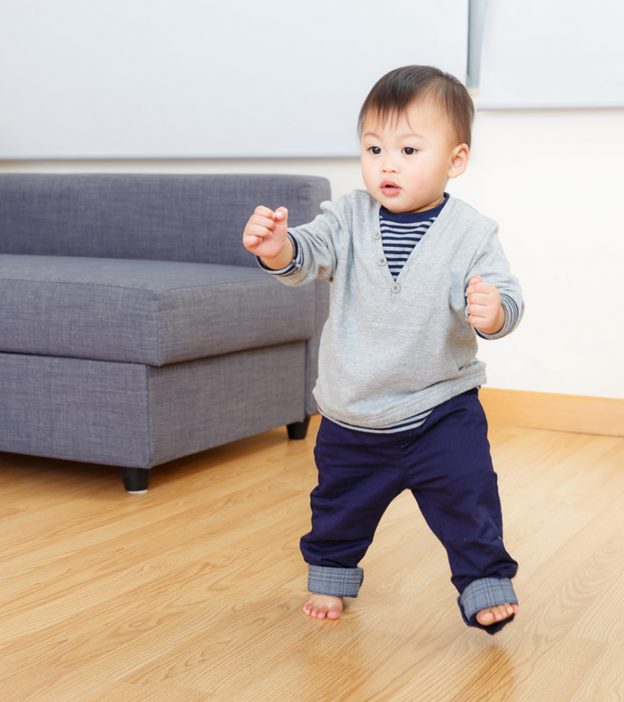what is the role of the stepping reflex in learning how to walk?

Image: Shutterstock
The stepping reflex in babies is a crucial reflex that trains the baby's leg muscles to prepare for crawling and walking. By and large, babies are born with several primitive reflexes, such as the stepping reflex, which help them survive after birth. Reflexes are automatic responses to a stimulus triggered past the fundamental nervous system (CNS).
The presence of archaic reflexes in babies is a vital indicator of their normal growth and development. Stepping reflex is one of the get-go reflexes that a kid volition exhibit and one of the commencement reflexes to fade away.
Continue reading to learn more than well-nigh the stepping reflex, its significance, and other primitive reflexes nowadays in babies.
What Is Stepping Reflex?
Stepping reflex or step reflex occurs when a babe is held upright with the soles of their feet touching a flat, solid surface. The baby begins to identify their anxiety i after the other, performing the stepping or walking activeness (1). Do note that the infant can neither stand nor walk. Nonetheless, they will perform the stepping action. The reflex is likewise known every bit the walking reflex or dancing reflex.
Why Do Babies Accept The Stepping Reflex?
The purpose of the stepping reflex is to aid the baby crawl to their mother's breasts when placed on the mother'due south belly (2). Therefore, the reflex in one case played an essential role in the initiation of breastfeeding.
The reflex may besides condition the baby's leg muscles to gear up them for crawling and walking later in life. It may also help the baby's nervous organization do various motor neurons and neural pathways to stay prepared for crawling and walking when the time arrives.
When Does The Stepping Reflex Get-go And Stop?
The stepping reflex is present at birth and disappears once the baby is two months onetime. It is the beginning archaic reflex to disappear (2). The reflex re-emerges when the baby is 12 months erstwhile and ready to stand up without back up and walk eventually.
What If A Babe Has No Or Weak Stepping Reflex?
Consult a pediatrician in instance the baby displays a weak or absent-minded stepping reflex. A pediatrician will probable check for the reflex later on the baby's nativity or during regular checkups. The absence of the stepping reflex or other primitive reflexes may bespeak underlying issues with the primal nervous organization (CNS). The risk may be higher in the case of preterm babies.
Since the reflex only triggers when specific conditions are met, it may not always trigger. You may try multiple times. Determination of underlying CNS problems requires multiple assessments and the presence of other signs. If your baby shows the healthy achievement of cerebral, physical, and social developmental milestones, the absence of stepping reflex may non be a business concern. Therefore, do non panic if the infant has an absent-minded or weak stepping reflex. Speak to your baby'due south pediatrician to assess and address any concerns.
Other Types Of Newborn Reflexes
Below are the other newborn reflexes found in babies (3) (4).
- Palmar grasp reflex: The newborn curls their fingers around an object or a finger when you stroke their palm with it. This reflex disappears past the age of vi months.
- Plantar grasp: When yous stroke the sole of the baby's anxiety, the baby opens the toes and curls the feet inward. Plantar grasp disappears between nine and 12 months of age.
- Moro reflex: The baby reacts to a loud racket past throwing dorsum the caput, extending legs, arms, and neck, and then chop-chop bringing the arms closer to the body. The baby may also weep during the reflex. The Moro or startle reflex peaks around i calendar month of historic period and disappears by the age of two months, although some babies may prove it for a few additional months.
- Rooting reflex: When you stroke the corners of the baby's mouth or cheeks, they turn their caput in the direction of the touch. This reflex helps a newborn find the nipple and latch to it. This reflex goes away by four months of age.
- Sucking reflex: When a nipple is placed inside the baby's oral fissure and touches their palate (mouth's roof), they instinctively begin to suck. The sucking reflex helps initiate breastfeeding in one case the baby finds and latches to the breast afterwards the rooting reflex. The sucking reflex also works when you lot place a finger or pacifier inside the baby'south mouth.
- Tonic neck reflex or fencing reflex: If the infant turns their head in a direction, the arm on that side stretches while the other arm bends at the elbow. Since it resembles a pose of a fencer, it is as well called a fencing reflex. The reflex disappears between the ages of five and seven months.
Reflexes are an important part of your infant'south development and highlight the nervous system'south good for you functioning. The stepping reflex is one such reflex, and it is associated with the training of the brain and coordination of the leg muscles to enable walking in the time to come. If you suspect your infant has weak or absent stepping reflex, do non hesitate to discuss information technology with a pediatrician on your next visit.
Central Pointers
- Pace reflex helps babies crawl to their mothers' breasts when placed on the belly.
- The stepping reflex disappears when the baby is two months and may re-emerge at effectually twelve months.
- Newborn reflexes in babies include palmar grasp reflex, plantar grasp, moro reflex, and rooting reflex.
References:
MomJunction's articles are written after analyzing the research works of expert authors and institutions. Our references consist of resources established by authorities in their corresponding fields. You tin learn more than almost the authenticity of the data nosotros nowadays in our editorial policy.
The following two tabs modify content beneath.
- Reviewer
- Writer

Dr. Dur Afshar Agha is a consultant pediatrician with decades of experience in diverse medical facilities both in Pakistan and Kingdom of saudi arabia. She has headed the Department of Preventive Pediatrics at the prestigious, Children's Hospital and Institute of Kid Health in Islamic republic of pakistan and is a life member of the Pakistan Paediatric Association. She has also completed her Post Graduate Program... more

Dr. Bisny T. Joseph is a Georgian Lath-certified physician. She has completed her professional person graduate caste as a medical dr. from Tbilisi State Medical University, Georgia. She has 3+ years of experience in various sectors of medical affairs as a physician, medical reviewer, medical writer, health bus, and Q&A expert. Her interest in digital medical education and patient instruction fabricated... more
Source: https://www.momjunction.com/articles/baby-stepping-reflex-definition-when-it-stop_00738384/
0 Response to "what is the role of the stepping reflex in learning how to walk?"
Post a Comment